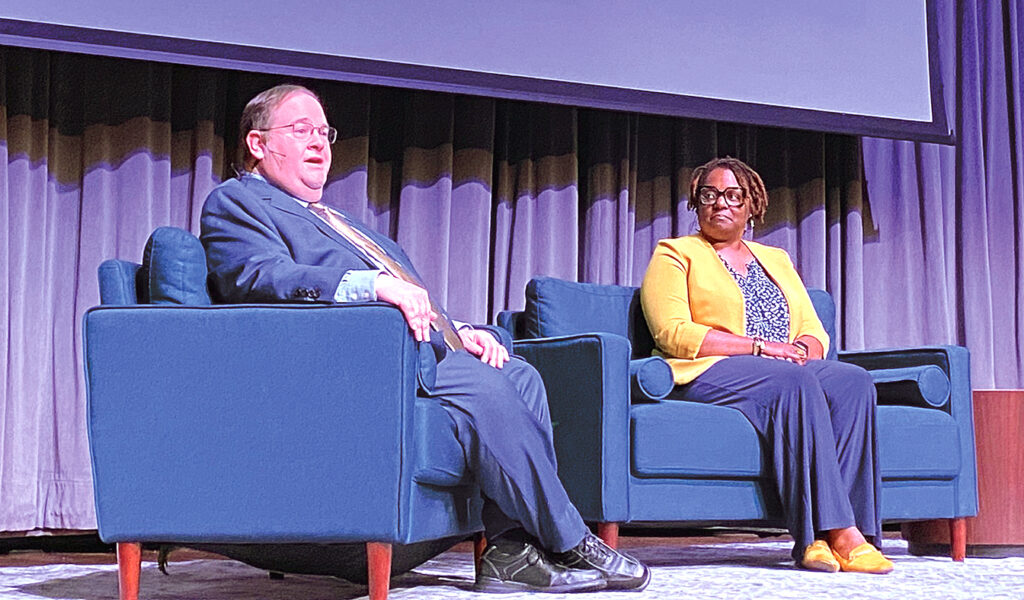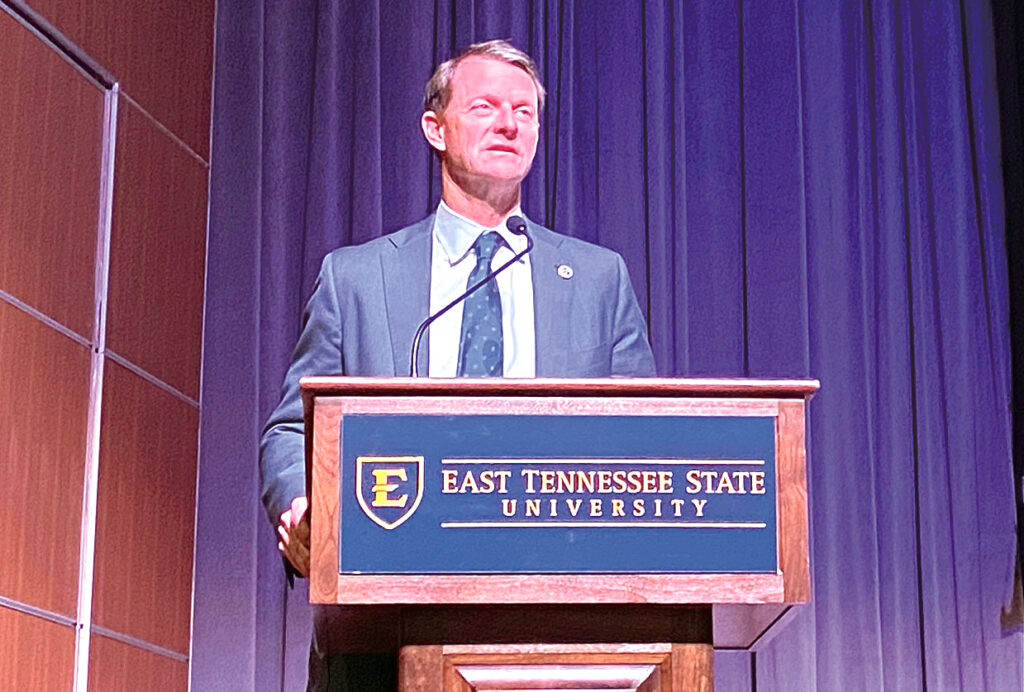
By A.J. Kaufman, Managing Editor
After the ETSU Department of Economics and Finance released a report designed specifically for the Appalachian Highlands, the school held a March 22 forum to discuss the findings and economic opportunities in the region.
Held inside the ETSU Martin Center for the Arts, the second annual Appalachian Highlands Economic Forum chose Tennessee Department of Economic and Community Development Commissioner Stuart McWhorter to serve as keynote speaker.
Hosted by President Brian Noland and Department Chair Taylor Stevenson, several academics also presented on various topics, including a regional economic outlook, a macroeconomic overview, market timing and strategies, as well as a housing market review.
Dr. Tony Pittarese, dean of ETSU’s College of Business and Technology, held a panel discussion with Dr. Christel Young, site director for the BlueSky Tennessee Institute. This is a unique partnership between BlueCross BlueShield of Tennessee and ETSU. The program, which began in 2020 with its first cohort of students, helps accelerate education, so that participants can earn a degree and secure a career at the same time. Many students go on to work for BlueCross, though that’s not a requirement. The duo agreed this has enticed and retained students in the region and is good for economic development.
The college’s motto says they seek to Educate, Innovate, Collaborate, and Inspire.
Prior to Pittarese and Young, Dr. Joseph Newhard delivered an analysis of the challenging housing market in Johnson City and across Northeast Tennessee. The associate professor of economics is concerned with affordability, particularly home prices rising faster than overall incomes and low inventory, due to population growth across the region. He argues that expensive houses and apartments are often being constructed instead of starter homes.
During roughly a half-hour of remarks, McWhorter praised ETSU and Northeast Tennessee effusively.
When relaying that the state landed 100 economic development projects for over 13,000 new jobs and approximately $4 billion in capital investments last year, he noted that about half of those projects occurred in rural Tennessee, including the Appalachian Highlands region. McWhorter said 35 of those projects fell in East Tennessee, and almost 43% of the 13,000 new jobs went into the East Tennessee Grand Division.
“We do think about how pivotal the Tri-Cities can be in leading regional business recruitment efforts,” he said. “There are so many assets here. I can stand up here for a long time talking about what those are, but you all know what they are.”
McWhorter claimed Tennessee is gaining attention with regards to nuclear energy. The state has a $50 million nuclear fund that focuses on the workforce or companies creating jobs around the industry.

“It’s amazing with Oak Ridge in your backyard, the types of things we get to see are remarkable,” he said. “If we can continue to push along those lines, we’ve got a great opportunity. Part of this is not only creating jobs, but we think about the sustainability of energy across the state. The whole world’s talking about it. We are talking about it every day in Tennessee. If we don’t start making these investments today, and it’s not just nuclear…it’s everything about clean energy and sustainability to the future…because it we can’t address this, whether it’s utilization and efficiency of energy or generation of additional power as a state, we need to be solving those problems.”
Another statewide initiative from the Department of Economic and Community Development surrounds transportation and mobility. Named the Tennessee Network Growth and Opportunity Initiative (TNGO), it is designed to encourage more research, innovation and development partnerships statewide.
McWhorter also spoke about working together across regions to improve the quality of life and economic status. He noted the relationships between state and local communities in Tennessee as a whole “can’t be found in other states.” This is noteworthy when doing site selections for businesses to expand or relocate, per McWhorter, who believes one of the greatest assets the state has is working well together with a common goal — from the governor’s level to local leadership and economic development professionals.
“Consider what is at stake for our future generations. Think about the thousands of lives that will be changed with the decisions and actions that we collectively in this room take,” McWhorter, who has served in his leadership role since 2022, concluded his remarks. “Whether it allows for that one individual to obtain the certificate for that dream job, or perhaps a college degree that one may not have been able to obtain otherwise…What we do collectively matters more now than ever and you/we have a chance to make a difference.”



